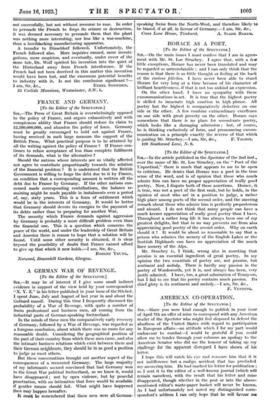HORACE AS A POET.
• [To the Editor of the SPECTATOR.]
SIR,—On the main issues I must confess that I am in agree- ment with Mr. St. Loe Strachey. I agree that, with a few little exceptions, Horace has never been translated and may be regarded as untranslatable ; and I can only think that the reason is that there is so little thought or feeling at the back of the curious felicitas. I have never been able to stand Horace for very long at a time because of his character of brilliant heartlessness, if that is not too unkind an expression.
On the other hand, I have no sympathy with these excommunications in art. It is true that the highest poetry is skilled to incarnate high emotion in high phrase. All poetry but the highest is comparatively defective on one side or the other. A few combine extraordinary excellence on one side with great poverty on the other. Horace says somewhere that there is no place for second-rate poetry, which looks like a damaging admission ; but, of course, he is thinking exclusively of form, and pronouncing excom- munication on a principle exactly the reverse of that which is guiding Mr. Strachey.—I am, Sir, &c., F. TALBOT. 109 Southwood Lane, N. 0.






































 Previous page
Previous page